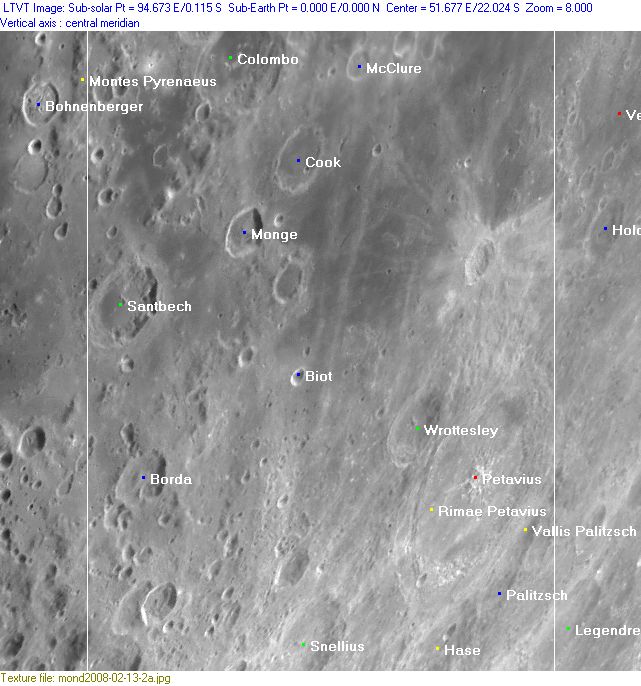Difference between revisions of "Rükl 59"
| Line 64: | Line 64: | ||
(click on the thumbnails to view full-sized images; use browser BACK button to return to this page)<br /> <br /> | (click on the thumbnails to view full-sized images; use browser BACK button to return to this page)<br /> <br /> | ||
===Full zone with [[Satellite%20feature|lettered craters]]=== | ===Full zone with [[Satellite%20feature|lettered craters]]=== | ||
| − | [http://the-moon.us/wiki/file/detail/Rukl_59_satellites.jpg [[Image:Rukl_59_satellites.jpg|external image Rukl_59_satellites.jpg | + | [http://the-moon.us/wiki/file/detail/Rukl_59_satellites.jpg [[Image:Rukl_59_satellites.jpg|external image Rukl_59_satellites.jpg|64x64px]]]<br /> <br /> |
===Lettered craters by quadrants=== | ===Lettered craters by quadrants=== | ||
(the dashed white lines are the centerlines of the Rükl zones)<br /> | (the dashed white lines are the centerlines of the Rükl zones)<br /> | ||
| Line 72: | Line 72: | ||
|- | |- | ||
| | | | ||
| − | [http://the-moon.us/wiki/file/detail/Rukl_59_satellites_NW.jpg [[Image:Rukl_59_satellites_NW.jpg|external image Rukl_59_satellites_NW.jpg | + | [http://the-moon.us/wiki/file/detail/Rukl_59_satellites_NW.jpg [[Image:Rukl_59_satellites_NW.jpg|external image Rukl_59_satellites_NW.jpg|64x64px]]]<br /> |
| | | | ||
| − | [http://the-moon.us/wiki/file/detail/Rukl_59_satellites_NE.jpg [[Image:Rukl_59_satellites_NE.jpg|external image Rukl_59_satellites_NE.jpg | + | [http://the-moon.us/wiki/file/detail/Rukl_59_satellites_NE.jpg [[Image:Rukl_59_satellites_NE.jpg|external image Rukl_59_satellites_NE.jpg|64x64px]]]<br /> |
|- | |- | ||
| | | | ||
| − | [http://the-moon.us/wiki/file/detail/Rukl_59_satellites_SW.jpg [[Image:Rukl_59_satellites_SW.jpg|external image Rukl_59_satellites_SW.jpg | + | [http://the-moon.us/wiki/file/detail/Rukl_59_satellites_SW.jpg [[Image:Rukl_59_satellites_SW.jpg|external image Rukl_59_satellites_SW.jpg|64x64px]]]<br /> |
| | | | ||
| − | [http://the-moon.us/wiki/file/detail/Rukl_59_satellites_SE.jpg [[Image:Rukl_59_satellites_SE.jpg|external image Rukl_59_satellites_SE.jpg | + | [http://the-moon.us/wiki/file/detail/Rukl_59_satellites_SE.jpg [[Image:Rukl_59_satellites_SE.jpg|external image Rukl_59_satellites_SE.jpg|64x64px]]]<br /> |
|- | |- | ||
| South West<br /> | | South West<br /> | ||
Latest revision as of 17:02, 22 April 2018
Contents
Rükl Zone 59 - PETAVIUS
Neighboring maps on the Rükl Nearside Map:
| 59 |
||
Photographic Map
(This map is based on an Earth-based photograph that has been computer-corrected to zero libration. The vertical white lines indicate the left and right boundaries of the Rükl rectangle)
Background image source
Named Features
- Biot (and the so-called straight rille, running from the southern part of Biot's rim toward a location south of Wrottesley, see H.Hill's A Portfolio of Lunar Drawings, pages 216, 217, 218).
- Biot Beta (the pronounced mountain-like mass east-northeast of Biot, northwest of Wrottesley) (see Chart 87 in the Times Atlas of the Moon).
- Borda (J.Hewelcke's Montes Caucasus inferior).
- Borda Delta (the central peak of Borda) (see Chart 86 in the Times Atlas of the Moon).
- Colombo (Van Langren's Welperi) (?) (E.A.Whitaker seems to be uncertain about that one) (was also J.Hewelcke's Mons Tancon).
- Cook
- Hase (J.Hewelcke's Mons Nerossus).
- Mare Fecunditatis (Van Langren's Mare Langrenianum) (the most southern part of it, occupying the upper right section of Chart 59).
- McClure
- McClure Delta (hill east of McClure, very near McClure P) (see Chart 75 in the Times Atlas of the Moon).
- Monge
- Montes Pyrenaeus (J.Hewelcke's Montes Caucasus).
- Orus (a disallowed name from H.P.Wilkins for the pronounced ray crater Petavius B, north-northwest of Petavius itself) (it is a mystery why this pronounced ray crater doesn't have an officially recognized name).
- Palitzsch
- Petavius (Van Langren's Triestis, J.Hewelcke's Mons Nerossus).
- Prom. Argolii (Van Langren's disallowed name for a certain spot between Santbech and Wrottesley).
- Railroad (a nickname from D.Caes for the peculiar rille at the southwestern part of the rim of Petavius, this feature seems to be the northwestern continuation of Rimae Hase) (see also Additional Information below).
- Rimae Hase
- Rimae Petavius
- Santbech (Van Langren's Gauraei, J.Hewelcke's Montes Caucasus inferior).
- Santbech Beta (the central peak of Santbech).
- Santbech Zeta (elongated hill southwest of Santbech, west-northwest of Santbech A) (see Rukl 58).
- Santbech Theta (tiny hillock northeast of Santbech, between Santbech and Monge).
- Sinus Inferior (J.Hewelcke's disallowed name for the southern part of Mare Fecunditatis).
- Snellius (Van Langren's Oxensterni) (note: on Van Langren's map of 1645 the crater which he called Oxensterni is part of a cluster of four; some sort of distinct quartet, together with Curtii, Ligni, and Segueri) (see Chart 69).
- Steavenson (a disallowed name from H.P.Wilkins for Reichenbach A, northeast of Reichenbach itself).
- Terra Mannae (Riccioli's discontinued name for the region between Mare Fecunditatis and Mare Nectaris).
- Terra Temperantiae (Van Langren's disallowed name for the region between Mare Fecunditatis and Mare Nectaris).
- Terra Vigoris (Riccioli's discontinued name for the southern half of Chart 59).
- Vallis Palitzsch
- Wrottesley (Van Langren's Conradi).
An extra "name":
- The Santbech boundary (according to A.J.M.Wanders, the boundary between Riccioli's Terra Mannae and Terra Vigoris runs south of Santbech, from the most southern part of Mare Fecunditatis to the most southern part of Mare Nectaris) (it is not known if Riccioli himself thought the same way as A.J.M.Wanders, we could only guess...).
Lettered Crater Locations
(click on the thumbnails to view full-sized images; use browser BACK button to return to this page)
Full zone with lettered craters
Lettered craters by quadrants
(the dashed white lines are the centerlines of the Rükl zones)
| North West |
North East |
| South West |
South East |
Additional Information
- Other online descriptions of features in this Rükl map section:
The railroad at the southwestern part of the rim of Petavius, and Rimae Hase
- I can't imagine it's a totally new discovery, this railroad-like feature on the southwestern part of the rim of Petavius. What is it? It seems to start just east of Wrottesley (the crater which is touching the west-northwestern part of the rim of Petavius) and it runs all the way to the southeast through the bowl-shaped crater Petavius C, and... much further across the unimpressive craters Hase and Hase D, until it meets Rimae Hase (or... are the railroad and Rimae Hase perhaps one and the same feature?). - DannyCaes Jan 7, 2016





